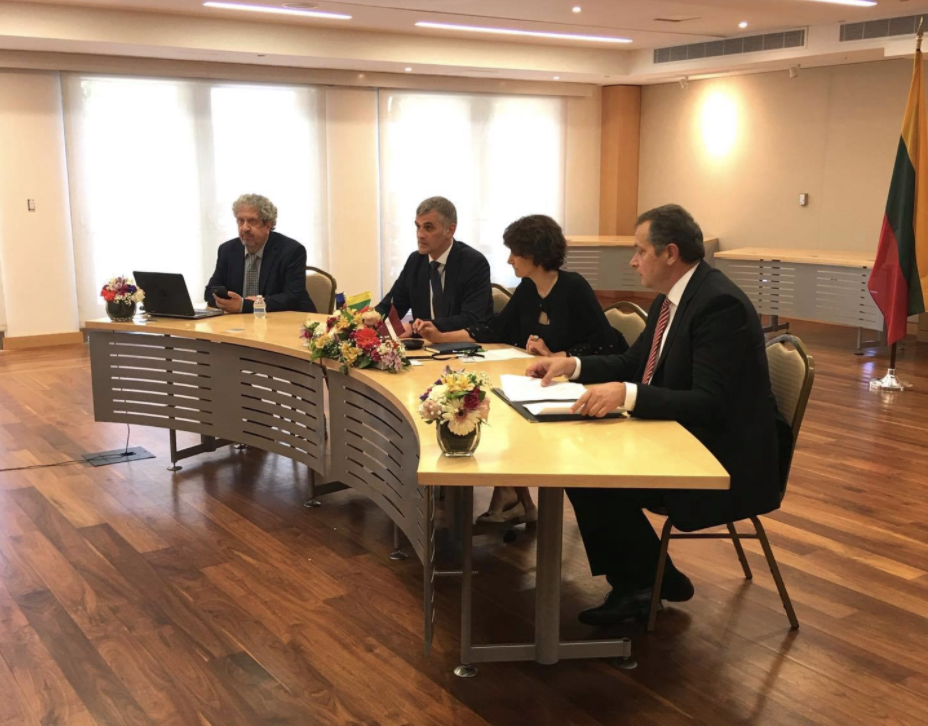On Monday, June 14th, the ambassadors of Estonia, Latvia and Lithuania to the United States met at the Lithuanian Embassy in Washington DC for a virtual discussion on “A Day of Mourning and Hope- The Living Memory of Soviet Deportees and Displaced Persons of the Baltic States.” June 14th of this year marked 80 years since the Soviet Army’s illegal and inhumane deportations of residents of the Baltic countries, and each ambassador had a chance to speak on their country’s experience and subsequent resilience in and recovery from Soviet occupation.
Lithuanian ambassador Audra Plepytė, who hosted the meeting, was joined by Latvian ambassador Māris Selga, and Estonian ambassador Kristjan Prikk. Each spoke of their country’s ordeal in 1941, and how each country survived this national catastrophe and emerged 50 years later as free and independent nations once again.
JBANC Managing Director Karl Altau moderated the panel with the ambassadors and the second panel, which was online and featured Lithuanian-American author Ruta Šepetys, professor Māra Lazda and Marija Čyvaitė – president of the American Lithuanian Youth Association, who joined virtually to share their thoughts and stories on Baltic deportations. To remember and mourn, as well as to maintain hope for a bright and stable future, were common themes that were emphasized throughout the meeting.
Author Ruta Šepetys has written four critically acclaimed books that have gained international attention and translated into more than 30 languages. As a daughter of Lithuanian refugees, she has been described as a “lost-story seeker” who hopes to give a voice to those who did not get a chance to tell their story. She mentioned in her remarks that “when justice cannot shape memory, remembering the past can be a form of justice.” It is important, as Šepetys related, to remember the events on June 14 and mourn those that were affected, but she also holds an optimistic view of the future. She stressed that the Baltic countries have historically opted for endurance over surrender and have used their challenges and experiences to find strength and build a brighter future.
Sharing her research on the testimonies of women deportees, Professor Māra Lazda of Bronx Community College of the City University of New York noted two themes throughout the testimonies of women – hope and trauma. Though traumatic for everyone, the experiences of women differed from those of men, as they were often separated completely and sent to different camps or prisons than the men. Hope is another common theme throughout the stories. While finding hope was difficult, it was often found in communicating and comforting each other and in dreams of returning home to Latvia.
Dr. Lazda reminds us of two important points – that although many deportees eventually returned to their native lands, they carried with them the experience of the deportation back to their homes, which continued to challenge their integration into society. Also, the June 1941 deportations were only the first wave of forced deportations. More Soviet deportations followed, including the deportation of other minority groups in Latvia. As Latvians, Lithuanians, and Estonians continue to move forward and build on our past experiences, it is important to recognize our commonality and solidarity with not only national experiences, but also international experiences.
Marija Čyvaitė spoke about her time participating in “Mission Siberia,” an expedition project that traveled to the poorly-maintained cemeteries of Lithuanian deportees and political prisoners who perished in Soviet prisons and forced-labor camps of the Gulag. Aside from traveling to and maintaining these gravesites, participants in the project met prior to the expedition with some of the few deportees who returned to Lithuania and are still alive today. These meetings provided an opportunity for those who were deported and eventually returned to share their story, as well as highlighting the importance of oral history. In some cases, participants in the project met with living relatives of those who were laid to rest in forgotten spots that were later rediscovered. The project was a great opportunity for Lithuanian youth to learn the history of their ancestors and pass that knowledge on to future generations so that those who were victims of Soviet horrors are never forgotten. Although the project has since been discontinued due to the political situation in the Russian Federation where a majority of the gravesites are located, a very similar initiative will be starting in the United States – with travel to various historical Lithuanian communities, reading and listening to the stories of those who lived through Soviet times, and the cleaning and maintaining of Lithuanian graves in the United States.
Later that day, at an event on the National Mall near the U.S. Capitol building, Lithuanian Ambassador Audra Plepytė, along with other embassy officials and members of the Lithuanian-American community, and JBANC team members (Grants Blumbergs, Vilis Sīmanis, Karl Altau) paid their respects by reading names of many of those persons deported from Lithuania. The readings took place in different parts of the world throughout the day. The reading was broadcast live on the Lithuanian Embassies Facebook page.


